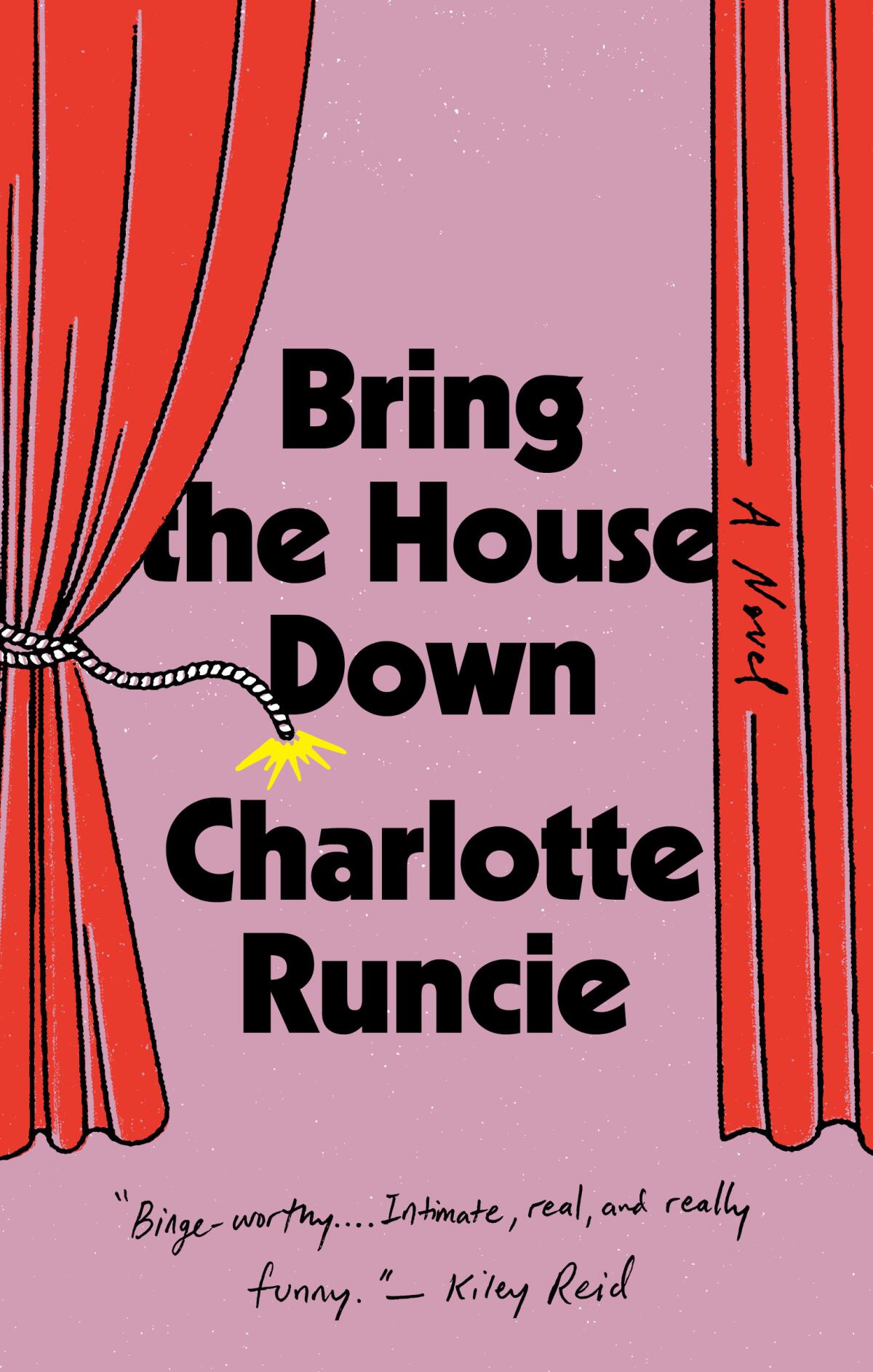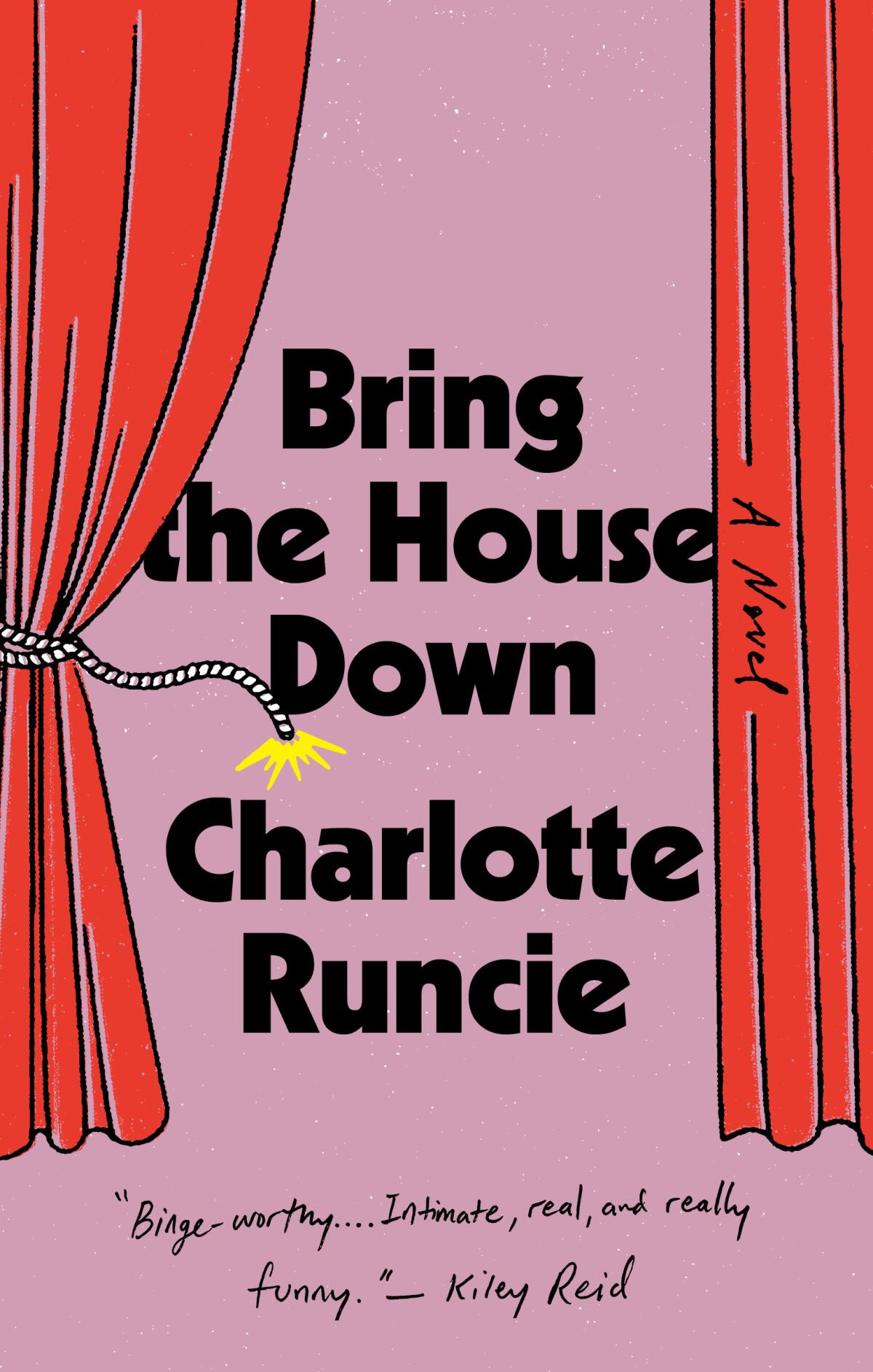‘Bring the House Down’ review: Charlotte Runcie lampoons Fringe critic
Book Review
Bring the House Down
By Charlotte Runcie
Doubleday: 304 pages, $28
If you buy books linked on our site, The Times may earn a commission from Bookshop.org, whose fees support independent bookstores
Any profession can corrupt its practitioners — and arts critics are no exception. Are they enlightened standard-setters dragging us back from a cultural abyss — or deformed exiles from the arts who, with sharpened pens and bent backs, are ready to pounce on plot-holes and devour careers at a moment’s notice?
If Charlotte Runcie’s debut novel, “Bring the House Down,” is anything to go by, it’s a bit of both. The book centers around four heady weeks at the Edinburgh Fringe Festival, which begins the unraveling of two newspaper critics who have traveled up from London to cover the sprawling performance art event. Runcie, a former arts columnist for the Daily Telegraph, has created something so delightfully snackable that you may, as I did, gulp it down in two or three sittings.
Runcie’s anti-hero is theater critic Alex Lyons. Alex gives everything he reviews either one star or five, and the latter are vanishingly rare. He bemoans a world of “online shopping reviews,” where “five stars has come to mean the baseline, rather than outstanding,” and so insists on panning almost everything he sees. What’s bad for artists is good for him: His reviews become desperately sought-after career makers or breakers. “The paper didn’t allow Alex to award zero stars. Otherwise, he’d do it all the time.”

“Bring the House Down”
(Doubleday)
We learn about Alex’s story through our narrator Sophie Ridgen, his colleague who, despite being in her mid-30s like Alex, is on a very different track. Alex rose quickly through the newspaper’s ranks, and his reviews are featured on the front page almost daily. Sophie continues to toil as a junior culture writer, picking up whatever scraps nobody else wants. Sophie is also a new mom, overworking to compensate for time lost to maternity leave. She feels uncomfortable in her post-pregnancy body, exhausted and frustrated with her husband. Alex, on the other hand, finds it “embarrassingly easy” to get laid.
But Alex’s glory days are numbered. Early on at the Fringe, he sees a one-woman show that, unsurprisingly, he hates. He writes a review as devastating as it is personal (calling the star a “dull, hectoring frump,” her voice a “high-pitched whine”). All of this would be business as usual for Alex except for one problem: After quickly filing his review of the show, he bumps into Hayley Sinclair, its creator and star, in a bar. He takes her home and sleeps with her. He knew the one star was waiting for her; she did not.
When she finds out, there is hell to pay. Hayley transforms her nightly show into the “Alex Lyons Experience,” collecting testimony from his ex-girlfriends and lovers, or even those who have simply received bad reviews from him. Over the following weeks her show swells into a Greek chorus of one man’s wrongs. The whole nation, including members of Parliament, have hot takes (the performance is livestreamed). It doesn’t help his case that Alex is a bit of a nepo baby, as his mother Judith is an actor whose name would be recognized in most British households.
Sophie, living with Alex in the company-rented flat, has a front row seat to his public unraveling. She watches the livestreams with guilty awe, stalks Alex and Hayley compulsively online, and feverishly scans social media for the latest gossip (Runcie is great at writing a fake mean Tweet/X dispatch). She starts missing calls with her husband and their toddler son, as she becomes fully obsessed with the drama unfolding in Edinburgh.
As she continues to inhabit the same flat as her colleague, Sophie is increasingly questioned by others as to whose side she’s on, Alex or Hayley’s. For much of the book, she seems unable to make up her mind. She refuses to give up on Alex, and increasingly becomes his only source of companionship, which she can’t help but find flattering. But she also finds herself sympathetic to and magnetized by Hayley, whose popularity is blossoming on the Fringe circuit and beyond.
While Alex and Hayley both appear to possess other-worldly levels of charisma, one flaw with Runcie’s novel is that this is something we are repeatedly told, rather than shown. Alex spends most of the book being condescending to Sophie, and yet she is transfixed by him. “He had the strange ability to make you feel as if you were the only person who was in on a joke, the only person who understood some fundamental truth about the world that escaped other people.” This feels unsatisfyingly generic, like something you might find in an online wedding vows template.
We are at least given more backstory and a more plausible explanation for Sophie’s fascination with Alex: the ego trip. Having been dragged down by motherhood, a rocky marriage, and grief over the death of her own mother, Sophie enjoys Alex’s increasing dependence on her, a lone rock of support amid an ocean of alienation. There is something undeniably delicious in watching someone you revere fall to their knees, and Sophie begins to see in Alex “a tiny flickering of fear, at first only visible as a barely perceptible interruption to his arrogance, like a power cut that dims the lights for just a hundredth of a second.”
Hayley, unfortunately, never quite comes to life in the same way. And it remains unclear why her show, which is essentially a litany of (legitimate) complaints about a real-life terrible man with some added pyrotechnics, takes Edinburgh and the entire country by such storm. “I find I can’t explain why it had the effect that it did,” Sophie tells us. “This wasn’t theater, not really; it was a happening. The audience weren’t spectators anymore, but a silent, connected web of righteous energy.” Without more to go on, we have no choice but to take her word for it.
The result feels like a missed opportunity to interrogate some important questions. How much does the identity (gender, race, or class) of the critic matter when it comes to their ability to judge art? What about the identity of the artist themselves? In other words, who shall criticize the critics? Readers may leave Runcie’s novel feeling that some of these questions go unanswered, but this deeply entertaining novel is nonetheless well worth the price of admission.
Mills is a writer and human rights researcher who has worked for Amnesty International, Human Rights Watch, the Wall Street Journal and Associated Press. She lives in New York.

